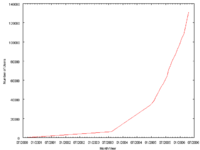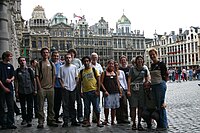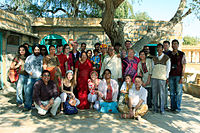BeWelcome
Hospitality exchange service
Social networking services where hosts do not receive payments
Hospitality exchange services (hospitality exchange platforms, hospitality exchange networks or HospEx) are social networking services used for accommodation of travellers, where hosts do not receive payments.[1][2][3][4] The relationships on hospitality exchange services are shaped by altruism[5][6] and are related to the cyber-utopianism on the Web in its beginnings and to utopia in general.[7][8]
On HospEx, members typically create public profiles that describe themselves and their travel plans, and then searching for potential hosts or guests based on various criteria such as location, interests, and availability.[9] Travelers connect with local hosts who are willing to offer free accommodation, meals, and/or other forms of hospitality during their trip. The concept of hospitality exchange has been around for a long time, with informal networks of travelers and hosts existing for decades. However, the advent of the internet and social media has made it much easier to connect with people from all over the world, and hospitality exchange networks have become increasingly popular as a way for people to avoid commercial tourism and experience local cultures in a more authentic way.[10] These networks are usually non-profit, registered under .org-domains, built up by volunteers and use open-source software.[11]
 |
 |
 |
 |
The biggest HospEx platform in 2012, "CouchSurfing appears to fulfil the original utopian promise of the Internet to unite strangers across geographical and cultural divides and to form a global community".[12] CouchSurfing used utopian rhetoric of "better world," "sharing cultures," and of much better access to global flows and networks of all sorts.[13] It was featured as a means to achieve a cosmopolitan utopia.[14] Commodification of CouchSurfing terminated "the existence of a project run as a flourishing commons, a cyber-utopian dream come true; an example of genuine exchange outside and free from the dominant logic of capital, a space highlighting cultural instead of monetary values, understanding instead of commerce. This space still exists, but instead of outside, now within the market."[7] After CouchSurfing became a for-profit corporation in 2011, some members urged others to join BeWelcome.[15][16][17] Many volunteers, who had become brand ambassadors of CouchSurfing, left to BeWelcome and other non-profit platforms because of the change in legal status and insufficient management transparency.[18]
Non-profit hospitality exchange services have offered scientists access to their anonymized data for publication of research on trust and cooperation. Before becoming for-profit, CouchSurfing offered four research teams access to its social networking data.[19][20][21][22] In 2015, non-profit hospitality exchange services Bewelcome and Warm Showers also provided their data for public research.[23]
| Name | Non-profit? | Year founded | Notes |
|---|---|---|---|
| BeWelcome | Yes | 2007 | BeWelcome (BW) is a non-profit, open-source hospitality exchange service accessible via the BeWelcome website or Android app. BeWelcome is operated by BeVolunteer, a nonprofit organization organized as a voluntary association registered in Rennes, Brittany, France, which is composed solely of volunteers. Membership in BeWelcome is motivated by the absence of for-profit pressure, democratic decision making, and a strict privacy policy.[24][23] The site had 234,000 users as of March 2023, across 216 countries.[25][26] BeWelcome was formed by members of Hospitality Club who had had a disagreement with its founder.[27][28][29] |
| CouchSurfing | No | 2004 | Casey Fenton founded CouchSurfing, where free accommodation can be offered. In 2011, Couchsurfing, previously a non-profit, was turned into a for-profit corporation.[30][31] Members in some developed countries pay a monthly subscription fee.[32] The conversion of the biggest of hospitality exchange service, CouchSurfing, to a for-profit corporation in 2011 was objected to by many of its members.[33] This was an instance of commodification.[7] CouchSurfing had previously been financed by donations and built using volunteer work.[33][34] |
| Dachgeber | Yes | 1987 | Wolfgang Reiche founded a non-profit German hospitality exchange service for cyclists within ADFC. |
| Friendship Force International | Yes | 1977 | Presbyterian minister Wayne Smith and U.S. President Jimmy Carter established Friendship Force International, with the mission of improving intercultural relations, cultural diplomacy, friendship, and intercultural competence via organized trips involving homestays. |
| Pasporta Servo | Yes | 1974 | Pasporta Servo facilities free lodging for Esperanto speakers and was established from the work of psychologist Rubén Feldman González in Argentina. Access to the service and lodging are free; however, some hosts may request reimbursement of food costs. |
| Servas International | Yes | 1949 | Servas International is a volunteer-run international nonprofit organization advocating interracial and international peace.[35] People wishing to join SERVAS must supply letters of recommendation and be interviewed to ensure that they understand the purpose and protocol of being a Servas member, whether as a traveller or host. Members pay an annual fee to the organization, which is determined locally by country.[36] |
| Trustroots | Yes | 2014 | In 2014, Trustroots was founded by Kasper Souren and Mikael Korpela in Berlin, Germany.[37][better source needed] Trustroots.org is a non-profit hospitality exchange service featuring “circles” for hitchhikers, cyclists, buskers, train hoppers, vegans and vegetarians, climbers and others.[citation needed][38][39][40][better source needed] In 2020, Trustroots had 44,000 members, from 220 countries.[41][42] In May 2022, the non-profit Trustroots Foundation was dissolved.[43] In September 2023, Trustroots reached 100,000 members. |
| Warm Showers | Yes | 1993 | Warm Showers is a non-profit homestay platform for traveling cyclists. It has over 173,000 members, including 114,000 hosts.[44] Registration requires payment of a one-time $30 registration fee.[45] |
| Hospitality Club (defunct) | Unknown | 1992 | Hospex.org was launched online; it later was folded into Hospitality Club,[46] which was created in 2000 by Veit Kühne. |
| Traveler's Directory (defunct) | Yes | 1965 | John Wilcock set up the Traveler's Directory as a listing of his friends willing to host each other when traveling.[47] In 1988, Joy Lily rescued the organization from imminent shutdown, forming Hospitality Exchange. |
| Travel Ladies | No | 2021 | Travel Ladies is a free, women-only hospitality exchange. |
- Ikkala, Tapio; Lampinen, Airi (15 February 2014). "Defining the price of hospitality". Proceedings of the companion publication of the 17th ACM conference on Computer supported cooperative work & social computing. CSCW Companion '14. Association for Computing Machinery. pp. 173–176. doi:10.1145/2556420.2556506. ISBN 9781450325417. S2CID 39491376.
- Spitz, Tara (2017). The commodification of hospitality An analysis of tourism encounters between interculturality and difference in regard to Turkish couchsurfing experiences (Graduate thesis). Kadir Has University.
- Håvardsholm, Angelica Kolstad (June 2016). How does gender influence couchsurfers behaviour intentions based on trust and perceived risk? (Masters thesis). Universitetet i Stavanger. hdl:11250/2413810.
- Ronzhyn, Alexander (2020). "Online identity: constructing interpersonal trust and openness through participating in hospitality social networks". The Journal of Education, Culture, and Society. 4 (1): 47–56. doi:10.15503/jecs20131.47.56. ISSN 2081-1640. S2CID 213038501.
- Rosen, Devan; Lafontaine, Pascale Roy; Hendrickson, Blake (1 September 2011). "CouchSurfing: Belonging and trust in a globally cooperative online social network". New Media & Society. 13 (6): 981–998. doi:10.1177/1461444810390341. ISSN 1461-4448. S2CID 14552636.
- "Value co-creation in Couchsurfing - the Indonesian host perspective". www.cabdirect.org. 2020.
- Schöpf, Simon (2015-01-25). "The Commodification of the Couch: A Dialectical Analysis of Hospitality Exchange Platforms". TripleC: Communication, Capitalism & Critique. 13 (1): 11–34–11–34. doi:10.31269/triplec.v13i1.480. ISSN 1726-670X.
- Latja, Piia (2010). Creative Travel - Study of Tourism from a socio-cultural point of view - The Case of CouchSurfing (Masters thesis). University of Tampere.
- Lampinen, Airi M I (15 February 2014). "Account sharing in the context of networked hospitality exchange". Proceedings of the 17th ACM conference on Computer supported cooperative work & social computing. Association for Computing Machinery. pp. 499–504. doi:10.1145/2531602.2531665. ISBN 9781450325400. S2CID 20255816.
- Molz, Jennie Germann (16 February 2012). "CouchSurfing and network hospitality: 'It's not just about the furniture'". Hospitality & Society. 1 (3): 215–225. doi:10.1386/hosp.1.3.215_2. ISSN 2042-7913.
- Schöpf, Simon (25 January 2015). "The Commodification of the Couch: A Dialectical Analysis of Hospitality Exchange Platforms". TripleC: Communication, Capitalism & Critique. Open Access Journal for a Global Sustainable Information Society. 13 (1): 11–34. doi:10.31269/triplec.v13i1.480. ISSN 1726-670X.
- Molz, Jennie Germann (2012). Travel Connections: Tourism, Technology, and Togetherness in a Mobile World. Routledge. ISBN 978-0-415-68285-5. Retrieved 26 June 2021.
- Picard, David; Buchberger, Sonja (2014-03-31). Couchsurfing Cosmopolitanisms: Can Tourism Make a Better World?. transcript Verlag. ISBN 978-3-8394-2255-7. Retrieved 26 June 2021.
- Chen, De-Jung (March 2018). "Couchsurfing: Performing the travel style through hospitality exchange". Tourist Studies. 18 (1): 105–122. doi:10.1177/1468797617710597. ISSN 1468-7976. PMC 6294175. PMID 30595668.
- "A rough ride to profit for CouchSurfing". sfgate.com. 26 November 2014.
- "Money causes schism in sharing economy". sgpress.ru. 22 May 2019.
- "Paradise lost: The rise and ruin of Couchsurfing.com". nputmag.com. 15 November 2021.
- "Managing a non-profit hospitality platform conversion: The case of Couchsurfing.com". Tourism Management Perspectives. 30: 138–146. 2019-04-01. 2019.
- Victor, Patricia; Cornelis, Chris; De Cock, Martine; Herrera-Viedma, Enrique (2010). "Bilattice-based aggregation operators for gradual trust and distrust". World Scientific Proceedings Series on Computer Engineering and Information Science. World Scientific: 505–510. doi:10.1142/9789814324700_0075. ISBN 978-981-4324-69-4. S2CID 5748283.
- Dandekar, Pranav. Analysis & Generative Model for Trust Networks (PDF). Stanford Network Analysis Project (Report). Stanford University.
- Overgoor, Jan; Wulczyn, Ellery; Potts, Christopher (20 May 2012). "Trust Propagation with Mixed-Effects Models". Sixth International AAAI Conference on Weblogs and Social Media.
- Lauterbach, Debra; Truong, Hung; Shah, Tanuj; Adamic, Lada (August 2009). "Surfing a Web of Trust: Reputation and Reciprocity on CouchSurfing.com". 2009 International Conference on Computational Science and Engineering. Vol. 4. pp. 346–353. doi:10.1109/CSE.2009.345. ISBN 978-1-4244-5334-4. S2CID 12869279.
- Tagiew, Rustam; Ignatov, Dmitry. I; Delhibabu, Radhakrishnan (2015). "Hospitality Exchange Services as a Source of Spatial and Social Data?". 2015 IEEE International Conference on Data Mining Workshop (ICDMW). pp. 1125–1130. doi:10.1109/ICDMW.2015.239. ISBN 978-1-4673-8493-3. S2CID 8196598.
- Ossewaarde, Marinus; Reijers, Wessel (21 August 2017). "The illusion of the digital commons: 'False consciousness' in online alternative economies". Organization. 24 (5): 609–628. doi:10.1177/1350508417713217. ISSN 1350-5084. S2CID 149344352.
- "Alternativen zu Hotels und welche Vorzüge sie haben". www.derwesten.de (in German). 21 May 2019.
- "Ditch The Hotels: Stay In Someone's Home On Your Next Vacay". outlooktraveller.com. 28 January 2020.
- Baker, Vicky (18 April 2008). "Going local in Caracas, Venezuela". The Guardian.
- Baker, Vicky (26 August 2011). "Budget Travel: Not-for-profit Couchsurfing becomes a company (with a conscience)". The Guardian.
- "Tips for Travel Savings in 2014". The New York Times. 7 January 2014.
- Lapowesky, Issie (29 May 2012). "Couchsurfing Dilemma: Going for Profit". Inc.
- Longenecker, Justin G.; Petty, J. William; Palich, Leslie E.; Hoy, Frank (15 January 2016). Small Business Management: Launching & Growing Entrepreneurial Ventures. Cengage. ISBN 9781305405745.
- Ferrarese, Marco (24 June 2020). "Pandemic hits 'couchsurfing' travel bug". Nikkei Asian Review.
- DeAmicis, Carmel (10 January 2015). "How Couchsurfing became the Friendster of the sharing economy". GigaOm.
- Vivion, Nick (11 October 2013). "CouchSurfing CEO steps down amid layoffs, uncertainty". Phocuswire.
- Koszewska, Julia Maria (2008). Gift, Exchange and Trust: Information (its role, management and access to information) in modern society on the example of free-hospitality networks (Masters thesis). University of Warsaw. 175528 – via Academia.edu.
- Hull, Dana (July 14, 1996). "SERVAS WITH A SMILE". The Washington Post.
- "Trustroots". tracxn.com.
- "The Best Websites For Finding Free Lodging During Your Next Vacation". TravelAwaits. January 10, 2021.
- Ryals, Mitch (May 13, 2015). "Derailed". Inlander.
- "Pandemic hits 'couchsurfing' travel bug". Nikkei Asia.
- ПРОСКУРЯКОВ, Евгений (2021-03-20). "Пять вещей, которые вы покупаете, а могли бы получить бесплатно". kp.ru (in Russian).
- "TRUSTROOTS FOUNDATION overview". Companies House. Retrieved 2023-09-17.
- "Member Statistics". Warm Showers.
- Koszewska, Julia Maria (2008). Gift, Exchange and Trust.
- Kirk, Robert William (1985). You Can Travel Free. Pelican Publishing Company. p. 100. ISBN 9780882894379.